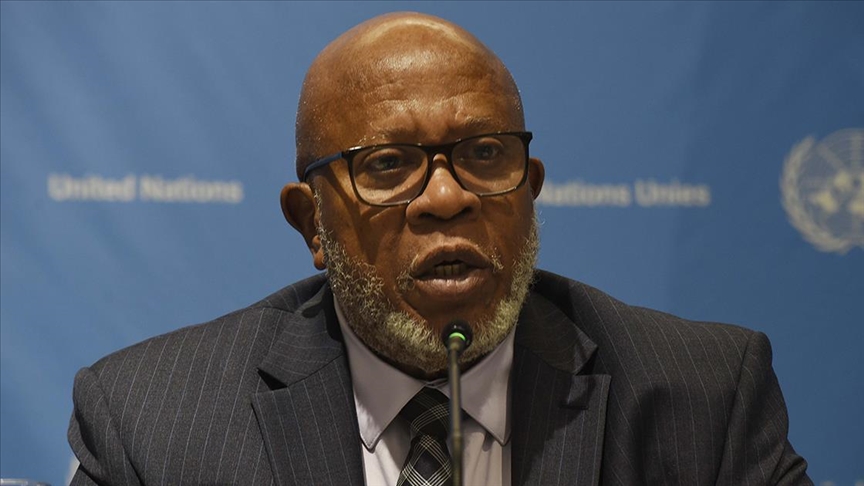NEW YORK
UN General Assembly President Dennis Francis lamented the killings of Palestinian civilians in Gaza, saying the avoidable situation in the Palestinian enclave should be brought to hold.
“Enough is enough,” Francis said in an interview with Anadolu. “Too many civilians have already lost their lives in Gaza. Too many women, too many children, in what was, without a doubt, an avoidable situation, it’s time to bring this to a halt.”
The president, whose one-year term will end this September, said it is time for Hamas to release all hostages and it is time for Gazans to get humanitarian aid and support so that they can begin to rebuild their lives.
“The cease-fire is important, among other things, because hopefully, it will, in some way, engender a political process that could and should result in the adoption of a two-state solution,” he said. “This cycle of bloodletting, mayhem, destruction is not sustainable.”
He cautioned that the violence in Gaza will bring “more hate, more destruction, more pain, more suffering, more psychological dislocation.”
“It it has to stop,” said Francis, calling for efforts to bring peace.
‘Total conflagration in Middle East’
Regarding the escalating tension between Israel and Lebanon, Francis said the longer hostility persists, the greater the probability that it will spill over and create new dynamics.
“That is why it needs to be brought under control because the last thing we want is a total conflagration in the Middle East. It will serve no one’s interests, no one,” said the General Assembly president.
“And so my hope is that all of the key players working in conjunction with their allies would do their endeavor best to avoid such a spillover because I do not believe that we would be able to sustain it,” Francis said.
UN’s failure on Gaza resolutions
When asked about the percieved failure of the UN to halt the conflict in Gaza, Francis said there has been a failure, but added that the failure has not been that of the UN or the General Assembly.
He recalled that the General Assembly was the first UN organ to pass a strong, decisive resolution on Gaza, in October of 2023, which called for a full cease-fire in Gaza as well as the release of hostages and access to humanitarian aid.
“Now we have had to make these calls repeatedly because the war continued to be prosecuted. That’s a decision made by the warring parties. So, to the extent that there has been a failure, there’s been a failure to follow the edicts of the General Assembly, the 193 states that make up the General Assembly, and there has been a failure to some degree on the part of the Security Council to pass an early, strong, decisive resolution on Gaza,” said the president.
“The failure does not belong to the UN, as frustrating as it has been for the UN, because the UN’s brand is always peace,” he added.
UN Security Council reform
About reform at the UN Security Council, which has been repeatedly raised by Turkish President Recep Tayyip Erdogan, whose motto is “the World is Bigger than Five,” Francis said there is a need for reform at the council.
“We need a reform that would position the Security Council to take the decisions that it’s empowered to take, and to take those decisions in the best interest of the world community at large, not in the interest, in the narrow interest of any individual state or group of states,” Francis told Anadolu.
“That is the purpose of the Security Council to make an assessment of the threats to international peace and security and to act to preserve and protect the peace and security of the planet. It was never the intention that the Security Council or members thereof would act in their own narrow sectarian interests,” he said.
“We need a Security Council that is agile, functional, bold, and that takes to heart the execution of its mandate under the charter. We do not, at the moment, have that in the Security Council.
“Perhaps in the future, hopefully, because there is a process of Security Council reform that is ongoing and which, of course, we fully support in the General Assembly. But for the moment, the fact that we are here discussing the issue of Gaza demonstrates that the Security Council had been operating at what can only be regarded as a suboptimal level, and, therefore, failing to properly discharge its mandate,” he said.
Veto rights of Security Council’s permanent members
Regarding the steps that the UN General Assembly could take to prevent permanent members of the UN Security Council from exploiting their veto rights, Francis said that the system, as it is structured, relies on a strong Security Council and a strong General Assembly.
He said that when the Security Council is confronted with situations threatening peace and security and finds itself paralyzed, unable to act decisively in the wake of extreme behaviors, wanton death, and destruction, the General Assembly, within its powers, steps up to the plate and takes certain decisions.
Recalling that the General Assembly brings in an obligation to any permanent member who used its veto right to explain its rationale, Francis said: “Now this is a transparency mechanism and an accountability mechanism.”
“And I think the initial impetus for it had to do with the hope that by subjecting members of the council who wield the veto to scrutiny, they would be forced to think twice about using it, as a deterrent mechanism,” he added.

